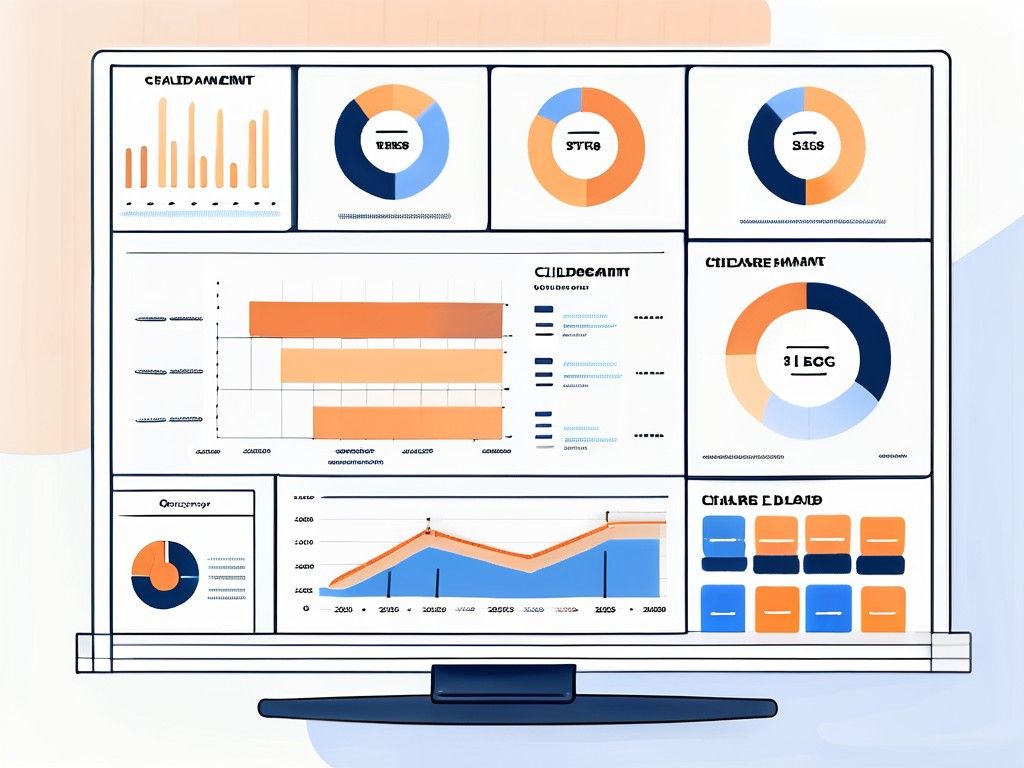In the competitive field of childcare, efficient management is essential for both the well-being of children and the success of the operation. This article will provide insights into the importance of effective childcare management, explore proven strategies that can enhance your childcare services, and discuss how to implement and evaluate these strategies in your center.
Understanding the Importance of Efficient Childcare Management
Efficient management in childcare settings is not merely a matter of administrative efficiency; it directly impacts the quality of care children receive. Properly managed operations ensure that each child’s needs are met and that parents feel confident in the environment provided. When management prioritizes organization and communication, it creates a seamless experience for both children and their families, fostering trust and reliability in the services offered.
Moreover, effective management practices contribute to the overall satisfaction of employees, which translates into lower turnover rates and a more stable atmosphere for children. A well-structured management system creates a foundation for a nurturing and supportive environment, enhancing both educational and emotional development for the children in your care. This stability is crucial, as children thrive in environments where they can form lasting relationships with caregivers and peers, allowing them to explore and learn without the anxiety of constant change.
The Role of Management in Childcare Operations
Management in childcare operations encompasses various functions, from staffing to resource allocation. A strong management approach enables you to devise effective systems for daily operations, coordinate activities, and develop policies that safeguard children’s well-being. This includes not only the logistical aspects of running a childcare center but also the emotional and developmental needs of the children, ensuring that every decision made is in their best interest.
Furthermore, management is responsible for fostering a culture of continuous improvement, ensuring that best practices are followed, and encouraging feedback from staff and parents alike. An engaged management team serves as a role model, influencing the workplace environment and enhancing the quality of childcare services. By actively seeking input from all stakeholders, management can adapt to the evolving needs of the community, implement innovative practices, and maintain high standards of care that benefit everyone involved.
Schedule a free 30-minutes session with us!
Key Benefits of Effective Childcare Management
Implementing effective childcare management strategies yields numerous benefits, including improved operational efficiency, higher staff morale, and enhanced child safety. Some key benefits include:
- Organized Environment: Efficient management leads to structured routines, helping children feel secure and promoting a sense of stability. This predictability allows children to engage more fully in their learning experiences, as they know what to expect throughout their day.
- Improved Communication: Clear management protocols facilitate better communication among staff, parents, and children, enhancing collaboration. Regular updates and open channels for dialogue ensure that everyone is aligned in their goals for the children’s development.
- Team Cohesion: A well-managed center promotes a positive work culture, strengthening teamwork and cooperation among employees. When staff members feel valued and supported, they are more likely to invest in their roles, leading to better outcomes for the children.
- Enhanced Funding Opportunities: Demonstrating effective management can improve the chance of securing grants and funding. A solid management framework not only showcases the center’s commitment to quality but also provides potential funders with confidence in the center’s ability to utilize resources effectively.
Additionally, effective management practices can lead to innovative programming that meets the diverse needs of children. By analyzing data and feedback, management can identify areas for growth and development, allowing for tailored educational experiences that cater to each child’s unique learning style. This proactive approach not only enriches the curriculum but also empowers educators to continuously refine their teaching methods, ultimately benefiting the children they serve.
Moreover, a focus on professional development within childcare management can foster a culture of lifelong learning among staff. By investing in training and resources, management can equip employees with the latest knowledge and skills in early childhood education, which can translate into more effective teaching practices and a deeper understanding of child development. This commitment to growth not only enhances the quality of care provided but also instills a sense of pride and purpose among staff, further contributing to a positive and enriching environment for children.
Proven Management Strategies for Childcare
To elevate your childcare operations, adopting proven management strategies is essential. These strategies are designed to streamline tasks and ensure that both children and staff are thriving in a conducive environment.
Staffing and Scheduling Strategies
Effective staffing is critical in childcare. Ensuring that you have the right number of qualified staff members during peak hours is vital. Use strategic scheduling practices that align staff availability with child enrollment patterns to meet demands effectively.
Regular training and development for staff members also play a significant role. By offering workshops and upskilling opportunities, you equip your team with the latest childcare techniques and knowledge, which in turn enhances the quality of care provided to children. Moreover, fostering a culture of mentorship within your staff can lead to improved job satisfaction and retention rates, as experienced educators share their insights with newer team members, creating a supportive learning environment.
Schedule a free 30-minutes session with us!
Communication and Collaboration Techniques
Open channels of communication are vital in a childcare setting. Establishing clear communication protocols between staff members can help create a collaborative environment where concerns are addressed promptly.
Engaging parents through newsletters and regular meetings is also advisable. This not only builds a partnership with parents but also encourages their involvement in the childcare community, reinforcing support for the center. Additionally, utilizing digital platforms for communication can enhance engagement; for instance, creating a dedicated app or portal where parents can access updates, schedules, and resources can foster a sense of community and keep parents informed about their child’s daily activities and milestones.
Safety and Compliance Measures
Prioritizing safety and compliance with regulations is non-negotiable in childcare operations. Regularly updating safety protocols, conducting drills, and ensuring that all staff members are trained in emergency procedures can safeguard children in your care.
Staying informed about local regulations and best practices ensures that your center meets compliance standards, which in turn builds trust with parents and enhances your center’s reputation. Furthermore, implementing a proactive approach to safety, such as regular safety audits and inviting feedback from staff and parents, can help identify potential risks before they become issues. This not only protects the children but also demonstrates your commitment to maintaining a safe and nurturing environment, which is paramount in fostering peace of mind for families entrusting you with their little ones.
Implementing Management Strategies in Your Childcare Center
Once you’ve identified effective management strategies, implementing them with precision is crucial for their success. Thoughtful integration leads to a smooth transition and minimizes disruptions within your center.

Steps to Incorporate New Management Techniques
When introducing new strategies, start with small, manageable changes. Assess current processes and determine which strategies will add the most value. Involve your staff in the decision-making process and solicit their input to enhance buy-in.
Additionally, pilot new strategies in phases to gauge their effectiveness before a full rollout. Monitor the outcomes, gather feedback, and refine the approach as necessary to ensure optimal implementation.
Overcoming Challenges in Strategy Implementation
Challenges such as resistance to change or resource constraints may arise during the implementation process. Anticipating these challenges allows you to develop proactive solutions.
Encouraging open dialogue can alleviate fears regarding new methodologies, and providing additional training or resources can help staff adjust smoothly. Acknowledging efforts and celebrating successes can motivate the entire team during transitions.
Evaluating the Success of Your Management Strategies
Measuring the effectiveness of implemented management strategies is essential for determining their impact on your childcare center. Evaluation enables you to refine processes and optimize operations continuously.

Key Performance Indicators for Childcare Management
Establishing key performance indicators (KPIs) can provide comprehensive insights into the efficiency of your management strategies. Indicators may include:
- Staff Turnover Rates: High turnover may indicate management or cultural issues.
- Parent Satisfaction Surveys: Valuable feedback helps you assess the perception of your services.
- Child Development Assessments: Positive outcomes in child development can reflect the efficacy of your practices.
Schedule a free 30-minutes session with us!
Continuous Improvement in Childcare Operations
Childcare management is not a one-time task; it requires ongoing evaluation and improvement. Regularly review your strategies and KPIs to identify areas for enhancement.
Encourage a culture of feedback that invites staff and parents to share insights. This collaborative approach can lead to innovative solutions and improvements in childcare quality and service delivery.
Future Trends in Childcare Management
As the childcare landscape evolves, staying engaged with future trends is imperative to remain competitive and effective. Understanding emerging trends will help you adapt and thrive in a dynamic environment.

Technological Innovations in Childcare Management
The adoption of technology can streamline operations significantly. Utilizing software for enrollment management, scheduling, and communication can save time and improve accuracy. Technology also facilitates data collection on child development, which can better inform practices and meet regulatory requirements.
Moreover, parent engagement apps are becoming popular, allowing for real-time updates on children’s activities and needs, fostering trust and collaboration between parents and caregivers.
Evolving Management Strategies for Childcare
Management strategies must be flexible to adapt to changing demographics, needs, and regulations. Trends such as inclusive practices and social-emotional learning are rising, influencing how management approaches care delivery.
By remaining informed and responsive to these trends, your childcare center can effectively meet the needs of the children you serve while ensuring operational success that benefits staff, parents, and the overall community.
